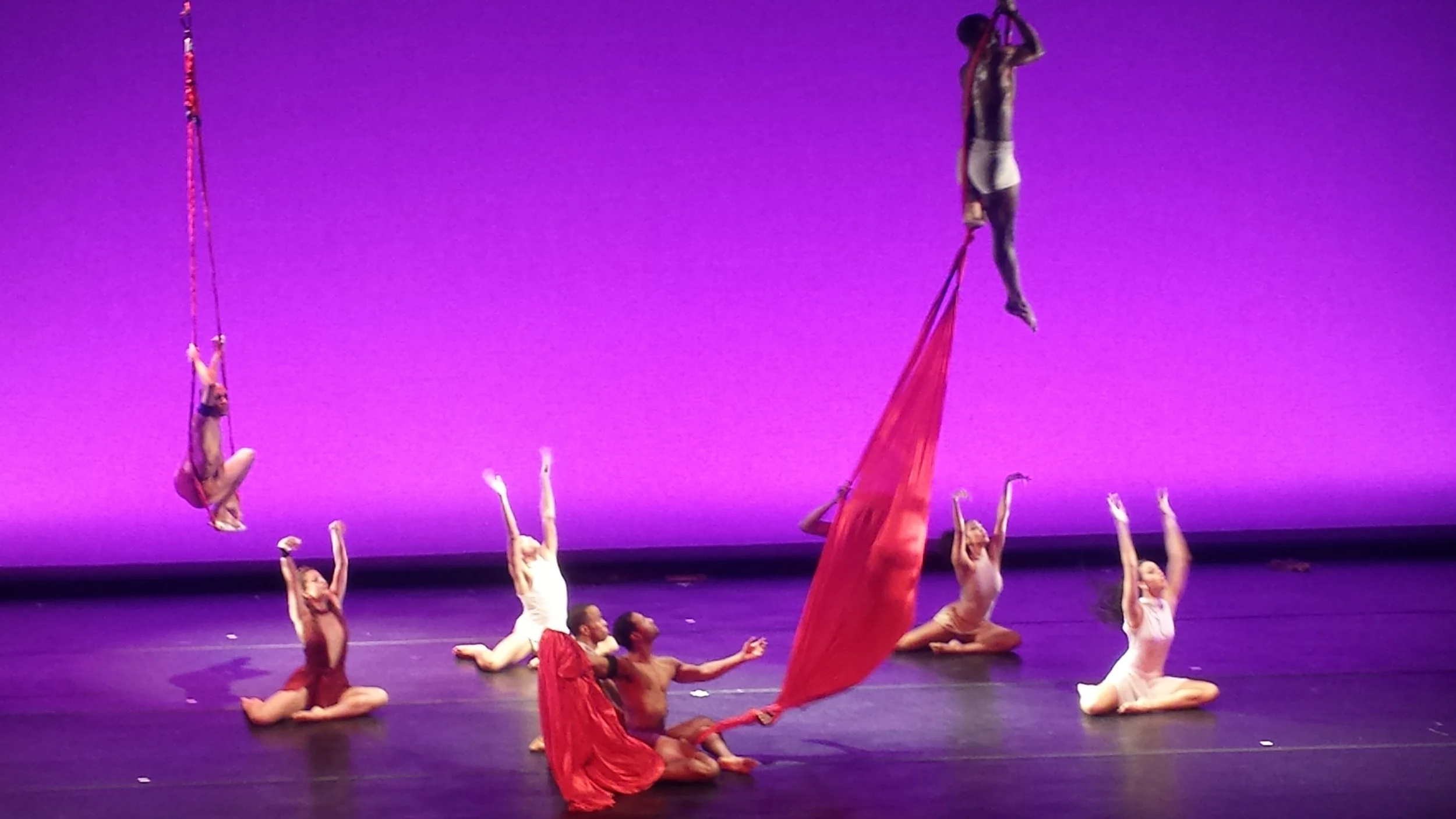In tennis, they’re called forced errors. These are mistakes that come out of the opponent’s solid playing, for instance when the shot was so strategic in placement that there is no way to return it without making an error.
It’s also a way to describe the paradox facing black grassroots organizations who strive to “succeed” in a capitalistic, white supremacist society: growth of any financial kind cannot happen without utilizing structures that leave no room for ancestors. “Yay, now we have money so we can...” turns into “Well, we have to implement this mandate to prevent employees from…”
Dallas Black Dance Theatre in The Parts They Left Out, as Eurydice follows Orpheus out of hell.
Like tax advantages, checks and balances favor the business vs the individual. None of it help us to Umoja or Ujima, and capitalism teaches us the dangers of prioritizing principle over bureaucracy.
Black Americans have experienced white capitalistic conformity for years individually. Straighten your hair to make it neater for that suit Black woman, because corporate doesn’t do kinky hair. Be sure to show teeth when you smile Black man, because that body looks threatening. Speak the King’s English only, because no one in business will respect less (unless you’re a wealthy white male). Respectability politics played out on our physical selves when Black people try to climb—these are clear.
It’s harder to see in grass roots non-profit organizations mid-climb because the compulsion to protect the growing business means all kinds of traps. The twice-as-good-half-as-far paradigm is on max, especially since donor support is oxygen:
Do not color outside of the lines.
Suffer zero scandals.
Be flawless on record.
Be sure all of your employees are flawless on record.
Appear and behave better than the stereotypes we have painted about your people behind circumstances America created for you even though you built it.
That last one is the juggernaut. Because none of capitalistic corporate America is concerned about whether the basis of “better” is wrapped around forced errors from serves like redlining, or drugs injected into communities with Black folks and no infrastructure. Having nothing to lose in a survival imperative forces errors. And white supremacy offers the same lack of second chances for Black organizations that it offers Black individuals.
So they beef it up, these Black companies. And once they reach the milestones that capitalism sets—almost always dollar-based benchmarks—it becomes time to adopt policies to help employees not rock the boat. There are protocols, hierarchies in place and systems to keep it all copasetic. They may also prevent an employee from being able to ask a simple question, or get some information without filling out paperwork that holds harmless the company (or the supervisor). Management contains no scaffold to share business insight the way it would from someone’s auntie in the village when sausage ingredients are queried about. Instead the cold, formal non-answer can come as a pin-drop email, sent in hopes that nobody will make a fuss or dent the stemware.
This is the place where the ancestors disappear, where community is trounced by hierarchy.
Rather than a council of elders it’s a folder of lawyer-penned missives. Instead of circling up to invite ancestors into the space, it’s updating the company handbook to reinforce accountability. Instead of hiring the dancer with grasp in her body and Wakanda in her back, we go with the less Nigerian-looking one who is “stunning” by Western standards.
Because companies like Alvin Ailey American Dance Theater, Dance Theatre of Harlem and Dallas Black Dance Theatre could only thrive if they complied, clear that non-corporate values might disengage donors with purses and presenters with contracts. At the times they founded legacies, Alvin Ailey, Arthur Mitchell and Ann Williams did not have the luxury afforded Alexandra Ocasio Cortez, who turned down big business funding that might contaminate any deliverables she promised her voters. These black visionaries had to take whatever they could get and worry about coin conditionals and handshake promises down the line.
There is a deeper dive here about the abuses dancers have suffered physically (and I mean from dance steps alone) in an effort for Black companies to prove their worth, our worth. It is another blog altogether that includes scars, traumas and hilarious anecdotes. The thing to know is that right or wrong, it was a response to a supremacist system that forced all the errors.
After all, Serena stopped wearing beads while whupping tail and they still called her coon before GOAT.
The way to move forward is to get in the rooms and have these dialogues. It is why I go to IABD every year, to fellowship with Black dance artists about where we are now and how to reconcile these world views. And to be clear, Dallas Black Dance Theater is one of the founding members of IABD. But charity begins at home, and I have faith that they’ll figure it out.
The good news is that grace, not force, is the more Africanist value of the two.
